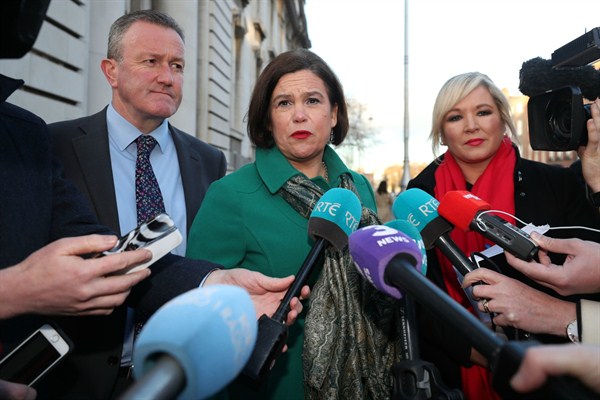BELFAST, Northern Ireland—As the 20th anniversary of the Belfast or Good Friday Agreement approaches this April, Northern Ireland once again finds itself in a political crisis. It has been without a government for over a year now, since the governing coalition in Belfast collapsed. Following the failure of talks last week between the two main parties, the Democratic Unionist Party, or DUP, and the nationalist Sinn Fein, the anniversary of the agreement that ended three decades of violence between Unionists and nationalists will be less of a cause for celebration. Of course, peace has held, more or less, since that deal was signed, but the hopes for a new kind of politics and a truly shared society in Northern Ireland have yet to be realized.
The “spirit” of the 1998 agreement—a buzzword used in particular by nationalists in recent years—embodied a notion of equal respect and recognition for all traditions, cultures and identities in Northern Ireland. Nationalists, who want to unite Northern Ireland with the Republic of Ireland, claim that their rival Unionists have never truly embraced this goal. On the other hand, Unionists view developments, especially since Sinn Fein became the dominant nationalist party in the early 2000s, as largely a one-way street of political and cultural compromises and concessions. They speak of Sinn Fein’s never-ending “wish list,” and they perceive the party’s objective to be a steady hollowing-out of British identity and cultural symbolism in Northern Ireland. Unionists of all hues believe that they made the most significant compromise of all by accepting Sinn Fein, whom they viewed as former terrorists, into government in the first place.
The failure of both parties to come together in another coalition is the latest sign that there is still a chronic lack of trust. Neither side believes that the other is serious about respecting them, and both in effect still pursue the endgame that the 1998 agreement was meant to render redundant. Notions of pluralism, the peaceful coexistence of respective identities and mutual respect for different constitutional preferences have all shrunk; older certainties and lines in the sand have re-surfaced. It appears, 20 years on, that Northern Ireland is still finding itself set in a binary, “either-or” political mold. If there is a willingness on the part of ordinary citizens in Northern Ireland, particularly the younger generation, to live happily with cultural diversity and to welcome increased social interaction—and there is much to indicate that this is the case—then it has to be said that such feelings cannot find adequate political expression. Too many people at election time still heed the clarion calls of traditional tribal loyalties.

